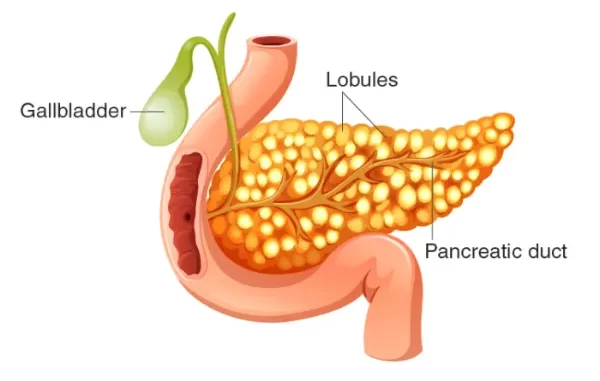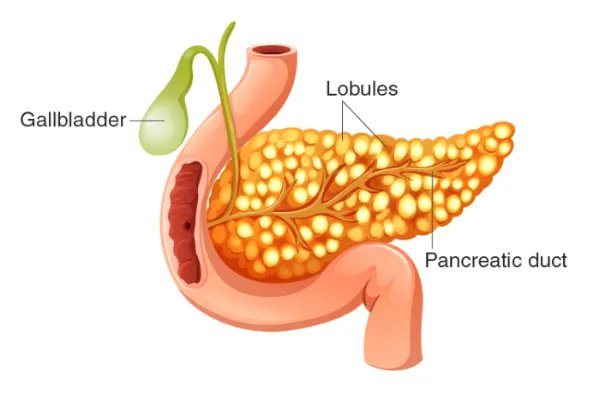
The human pancreas is an essential organ that plays an important role in the digestive system. It produces hormones such as insulin and glucagon that regulate blood sugar levels, and it also produces enzymes that help break down food in the small intestine. Despite its important role in the body, many people don’t know much about the pancreas. Here are some fun facts about the human pancreas that you may not have known. Also make sure to read our fun facts about humans brain blog post.

Unveiling the Mystery of the Human Pancreas: Fun Facts and Unusual Discoveries
The human pancreas is a vital organ, but one that often goes underappreciated. Located in the abdomen, the pancreas is responsible for producing digestive enzymes and hormones that help the body break down food, regulate blood sugar levels, and absorb nutrients. But what else is there to know about this mysterious organ? Here are some interesting and unusual discoveries about the human pancreas that you may not have known before.
Did you know that the pancreas has two distinct sections? The first part is called the exocrine pancreas, which produces enzymes to help digest food. The second part is the endocrine pancreas, which produces hormones to regulate blood sugar and other bodily functions.
The pancreas is a surprisingly versatile organ, capable of changing its shape depending on demand. When the body needs more digestive enzymes, the exocrine pancreas will swell and expand to produce more.
The pancreas is also home to a unique population of stem cells. These cells, known as pancreatic stem cells, can regenerate and replace damaged or dead cells. This makes them a promising target for treatments of pancreatic diseases.
The pancreas may also play a role in the aging process. Studies have found that cells in the pancreas produce a hormone called somatostatin, which decreases with age. This hormone is believed to regulate the body’s metabolism and may play a role in the aging process.
Finally, in some unusual cases, the pancreas can actually move around in the body. This phenomenon, known as pancreatic migration, is usually caused by abdominal surgeries or trauma and can cause complications such as digestive problems.
The human pancreas is a fascinating organ full of mysteries waiting to be unraveled. With each new discovery, we gain a better understanding of how the pancreas works and how it can be used to improve our health.
Fascinating Facts About the Human Pancreas – Uncovering the Mysteries of Our Anatomy
The human pancreas is an organ located behind the stomach and plays a vital role in digestion and metabolism. It is responsible for producing several hormones and enzymes that help to break down food and absorb nutrients. Here are some fascinating facts about the human pancreas and its many functions:
The pancreas is made up of two main parts: the exocrine and endocrine sections. The exocrine section is responsible for producing digestive enzymes, which help the body break down food particles into smaller molecules so they can be absorbed by the small intestine. The endocrine section produces hormones, such as insulin and glucagon, which help regulate blood sugar levels.
The pancreas also contains cells called islets of Langerhans, which produce hormones that help regulate metabolism and digestion. These hormones include insulin, glucagon, somatostatin, and ghrelin.
The pancreas is constantly producing digestive enzymes to break down proteins, carbohydrates, and fats in the food that we eat. Without these enzymes, we would not be able to absorb nutrients.
The pancreas also helps to regulate blood sugar levels by releasing insulin, which helps the body take up sugar from the bloodstream and store it as energy. It also releases glucagon, which helps the body convert stored energy into glucose, when needed.
The pancreas is essential for good health, and any damage or disease of the pancreas can lead to serious health problems. Pancreatic cancer is one of the most deadly forms of cancer, and it is estimated that more than 50,000 people in the United States are diagnosed with it each year.
These facts about the human pancreas demonstrate how complex and important this organ is to our overall health and wellbeing. It is clear that we need to take good care of it, and if any problems arise, seek medical attention immediately.
Human Pancreas: Uncovering the Unique and Unexpected Fun Facts
The pancreas is a fascinating yet often overlooked organ. It is a key component of the human digestive system and has many unique and unexpected functions. Here are some fun facts about the pancreas and its vital role in our bodies.
Did you know that the pancreas is the only organ in the human body that produces both hormones and digestive enzymes? It is located behind the stomach and plays an important role in regulating the body’s metabolism and blood sugar levels. The hormones it produces, such as insulin and glucagon, regulate the body’s use of glucose and energy.
The pancreas also produces a range of digestive enzymes that help to break down carbohydrates, proteins, and fats. These enzymes are released into the small intestine where they help to break down food and aid in the digestion process.
Another interesting fact about the pancreas is that it is the only organ in the body that can regenerate itself. If a pancreas is damaged, the healthy cells can grow back and replace the damaged cells. This process, called regeneration, helps the pancreas to stay healthy and functioning.
Finally, the pancreas is also responsible for producing bicarbonate, a molecule that helps neutralize stomach acid. Bicarbonate helps to protect the lining of the stomach and small intestine from the corrosive effect of stomach acid. Without it, many of the digestive processes we rely on would not be possible.
These are just a few fun facts about the pancreas and its unique and unexpected functions. As you can see, the pancreas is an incredible organ that plays a vital role in human health and digestion.
Leave a Reply